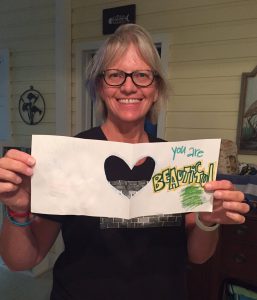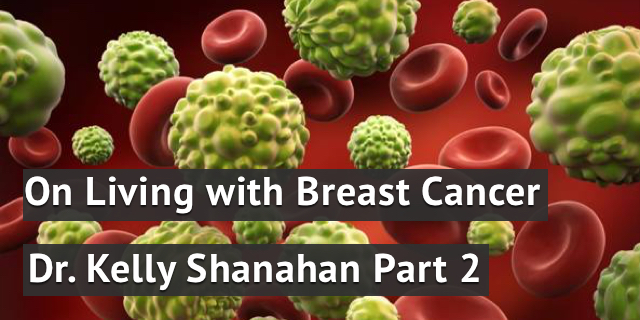In From Physician to Patient, I introduced Dr. Kelly Shanahan, a mother, wife, and obstetrician-gynecologist living and working in California. Her life changed with a breast cancer diagnosis.
“In 2008, I was diagnosed with early stage breast cancer, stage IIB to be exact. I underwent an aggressive bilateral mastectomy, because
1) as an ob/gyn with a busy solo practice and a mom with a 9-year old daughter, I didn’t have time to have the more common lumpectomy and 35 sessions, with 7 weeks of radiation Monday through Friday
and
2) I didn’t want to ever have to think about breast cancer again.”
Being a physician with breast cancer
To learn more, I asked Dr. Shanahan if being a physician changed the way her oncologists talked to her about breast cancer.
When you were diagnosed at age 47, did anyone say to you that you needed to be vigilant or watchful about recurrences? or did they assume that as a physician you would be aware and would know about the risks? Was there a problem with them assuming that you knew everything?
“When I was diagnosed with early stage breast cancer at age 47, my surgeons at UCSF were excellent at treating me like any other patient, albeit one who could speak “medical.” Even though I walked in the door knowing I wanted a bilateral mastectomy with implant reconstruction, they reviewed every option with me, including recurrence risks.
But they were mainly talking about local recurrences with lumpectomy. My medical oncologists talked about how chemo would lower the risk of a recurrence, but not one person ever said, ‘you know, 30% of early stage breast cancer patients will metastasize, some many, many years after treatment for early stage.’
I was told that if I made it five years without a recurrence, I was good. When I asked about following tumor markers, or getting periodic lab tests or scans to rule out a recurrence, I was told ‘these things don’t lower the mortality rate, so we don’t recommend them.’
I wasn’t an oncologist, so I trusted their recommendations. Maybe they assumed I knew more than I did, but now I question everything, and I encourage all other patients to question everything as well.”
“Cancer wasn’t done with me.”
 Unfortunately, even though Dr. Shanahan had only one positive lymph node, underwent a bilateral mastectomy and did 16 weeks of IV chemo, she had a recurrence over 5 years after her initial diagnosis.
Unfortunately, even though Dr. Shanahan had only one positive lymph node, underwent a bilateral mastectomy and did 16 weeks of IV chemo, she had a recurrence over 5 years after her initial diagnosis.
“Cancer wasn’t done with me.
In the summer of 2013, as I was walking up the stairs in my office I sneezed, and immediately developed searing back pain. ‘A pulled muscle,’ I thought and I did all the pulled muscle things – ice, then heat, ibuprofen, massage. When it didn’t improve in several week, even after seeing my chiropractor, I thought, ‘ok, it’s probably a herniated disc, probably should get an MRI.’ But I was busy and I kept putting off the imaging tests.
I never once thought it could be cancer rearing its ugly head again. Eventually, I started limping, which was especially pronounced when I chaperoned a high school drama department field trip to Ashland, Oregon in late September.
I didn’t want to reschedule patients to have a silly scan, so it was about 6 weeks later, on my birthday, when I had the MRI and (just because I could) a PET scan too. There were lesions – metastatic spots – in bones from the base of my skull to my thigh. The back pain was a fractured vertebra. My left femur was about to break. My orthopedic surgeon friend wanted to put a rod in my femur the next day, but I was operating on several women and I put it off.
Six days after diagnosis, I had a titanium rod inserted into my left femur. Ten days after that, I started what would turn out to be 14 months of combination IV chemo, an unconventional approach but I liked the idea of thinking out of the box and accepted my oncologist’s recommendation without question. It worked for me, and I achieved the coveted NEAD (No Evidence of Active Disease) status within a few months. I have remained NEAD since April of 2014, and currently am on an aromatase inhibitor, a type of medication designed to block the estrogen that my cancer loves.
For now this approach is working. I am very, very lucky. The median life expectancy for someone diagnosed with metastatic breast cancer is three years – shorter for some subtypes and locations of mets, longer for others, like me with bone only estrogen receptor positive, HER2 negative disease, where the median is five years.
At some point my cancer will progress – that is just the nature of metastatic disease. I will always be in treatment. I will die from metastatic breast cancer before I otherwise should (my paternal grandparents lived well into their 90s, my maternal grandmother to 88, and my mom is 91.5 years old).
When people ask me when I’ll be finished with treatment, my response is ‘shortly before you attend my funeral.’ My hope lies in research, not necessarily for a cure, but for treatments that will extend my life in a meaningful way, and with good quality. I have a daughter to see graduate from college in 2020, and I’d sure like the chance to see her established in a career, happy, fulfilled, and oh, wouldn’t a grandchild be nice!”
Advice
Dr. Shanahan has advice for those living with breast cancer that has metastasized.
“For those who are diagnosed metastatic, whether it is from the get-go (de novo) or a later recurrence, as will happen for 20-30% of us, first, take a big, deep breath. While MBC is not curable at this time, there are more and better treatments to not only extend our lives, but that may afford us a better quality of life. Second, GET A SECOND OPINION, preferably with an oncologist that specializes in breast cancer, and ideally has a research interest in or a large practice consisting of metastatic breast cancer patients.
Join a support group for people with MBC, whether in person or online. If you are in a smaller town, like me, online communities can be invaluable. I don’t know what I would do without my online metastatic friends who just get it.”
Dr. Shanahan has become an activist and is involved in reviewing research as well as presenting research. In our next post, we will discuss her most recent work.







Dr Shanahan, did you take Arimidex after your initial diagnosis? I was diagnosed 18 months ago and had a bilateral mastectomy after two lumpectomies couldn’t get clear margins. No lymph node involvement. Stage ll b. My legs are going numb and hips hurt all the time but Drs won’t acknowledge it could be Mets as my CMP and CBC are ok though they were at the time of my dx Maybe it’s the Arimidex. I’m worried sick all the time.
Debbie,
I did take an aromatase inhibitor after my early stage diagnosis, but did not stay on it because of horrible arthritis like side effects that made it difficult for me to perform surgery.
Doctors should take symptoms seriously; while yours certainly could be a side effect of your arimidex, metastatic disease should be ruled out. By the way, my CBC and chemistry panels were completely normal, even my alkaline phosphatase, despite mets in almost every bone in my body. Be your own best advocate.
Best wishes
Thank you so much for your story. I too was IIB, her2+, one lymph node positive. I’ve been NED for 9 yrs and every ache or pain brings that ugliness back to the front. I and my oncologist are always checking to make sure I’m clear. I would love to follow your journey. Do you gave a website?
Prayers for you and your family.
Thank you for sharing your story.
I’m going on six years and counting, of being cancer free. I was diagnosed with stage 2A Breast cancer, in 2012 at the age of 44. I wanted my doctor to remove the breast, but he satiated that he could save the breast. So after much prayer, I had the lumpectomy, no lymph node involved . Four rounds of chemo and 19 rounds of radiation, then a hysterectomy,and put on Femara, I only was able to tolerate it for a little over a year. The side effects were hard. Every 3 to 4 months I have labs done. And see my breast doctor every six months. Before cancer, I had lots of chest and abdominal pain, which after seeing a cardiologist , ruling out heart issues, I seen a gastroenterologist, who diagnosed me with acid reflux. While in treatment, the reflux got worst. I started having back pains and pain on my left side, so I saw a neurologist,who sent me for a MRI, back in 2016 and if showed minor issues with my c3, c4, and that was it. So I stared physically therapy, which was helping. I say was because I stop going. And I started eating all the wrong foods. I get frustrated with every ache and pain, and the fear of that ugly booger showing it’s self up. I’m due in a few weeks to have my blood work and mammogram. Lately I’ve been experiencing pain above my stomach and in my breast. My doctor feels it’s due to diet. Last year I had a ultrasound on my breast and it was clear. During a visit to the emergency room,for the pain, they ran a cat scan of my head and back and chest , also X-ray,all have been clear. I’m thanking God for life. I really hate cancer. I’m seeing a holistic doctor, to try and get things in line. Oh I treated at CTCA, and they did both conventional treatments and natural pathic . Mind Body and soul. The one thing I questioned was why they never ran a pet scan? MRI’s and Ultrasounds , X-rays . Oh the type of chemo I had was T. C.